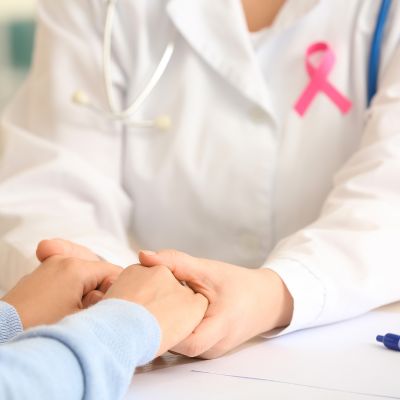Breast cancer is a life-changing event. If you receive a diagnosis, you want to know that you have a team of experts on your side. At Evansville Surgical Associates, we do everything we can to help our patients. Whether it’s utilizing the latest in breast cancer surgery or identifying early warning signs, we are here to help you get the treatment that you need.

We are proud to offer the Sirius Pintuition for tumor location. This helps our surgeons find early-stage tumors much more easily and without the need for wires. Common risk factors for breast cancer include age, lack of exercise, nutrition, and smoking. It’s also important to know how to spot the early possible signs of breast cancer.
Better Location Detection
At Evansville Surgical Associates, we are always looking for the latest advancements in surgical care. That’s why we’re proud to announce that we now offer the Sirius Pintuition. It’s a brand new way to locate tumors in their earliest stages when they can be hard to see or feel. Unlike traditional wire methods, Sirius Pintuition is much less invasive while offering additional benefits.
With Sirius Pintuition, patients will experience:
- More flexibility in scheduling
- Reduced wait times
- Reduced pain
- Less stress
It works thanks to the Pintuition Seed and GPSDetect. The Pintuition Seed is a tiny, powerful magnet used to mark the hard-to-find tumor. It is paired with GPSDetect—a state-of-the-art software that utilizes localization technology that locates the seed. Together, they provide intuitive, navigational guidance for our surgeons to locate and remove the tumor.
At Evansville Surgical Associates, we take a multidisciplinary approach to provide the be possible care. This includes working with oncology, breast radiology, radiation oncology, and geneticists.
Click here to learn more about the Sirius Pintuition!
Evaluating Risk Factors
The risk of developing breast cancer can vary from patient to patient. For example, it is true that women are at a higher risk for the condition, but there are rare cases where men also develop it. Similarly, while a family history of breast cancer can increase your risk, so can lifestyle choices.
Common risk factors for breast cancer include:
- Age
- Breast density
- Race/ethnicity
- Smoking
Age plays a very important role in your risk of developing breast cancer. Younger women run a lower risk of developing the disease, but this begins to change as they grow older, especially from age 55 onward. The majority of invasive breast cancer cases (⅔) occur in this age range.
While not an abnormal breast condition or disease, breast density can be a factor in developing breast cancer. This is because women with denser breast tissue are more likely to develop the disease. Researchers aren’t sure why this is the case, but it’s an important factor to be aware of.
When it comes to race and ethnicity, women of European descent are slightly more likely to develop breast cancer than Black, Hispanic, or Asian women. On the other hand, Black women tend to experience more aggressive cases of breast cancer at younger ages.
Along with other forms of cancer, smoking has been connected to premenopausal women developing breast cancer. Exposure to large amounts of second-hand smoke may also play a role in premenopausal women developing breast cancer, as well.
For more on breast cancer risk factors, click here!
Identifying Warning Signs

The earlier breast cancer is caught, the better the outcomes will likely be. This is why regularly scheduled mammograms and self-exams are so important. But lumps aren’t the only symptom of breast cancer that women need to be aware of. In their ebook titled Know the Symptoms, the National Breast Cancer Foundation provided two other early symptoms of the disease.
There are many conditions that can affect how the nipple looks, so it’s important to have any changes examined by your doctor. Inflammation of the skin from breast cancer can be one of them. This can result in texture changes such as pitting, raised ridges, or dimpling of the nipple similar to an orange peel.
Skin that’s very dry or looks similar to a sunburn is another significant warning sign. Pay special attention to unusual changes in the shape, such as swelling or shrinking, particularly on only one side or area of the breast.
Click here to learn more about possible warning signs of breast cancer!
How the nipple feels is another important warning sign to be aware of. Undiagnosed breast cancer is usually painless. With that, inflammation can sometimes result in a burning sensation or feeling of:
- Discomfort
- Itchiness
- Pain
- Tenderness
Breast cancer can also affect the lymph nodes near the breast. This can result in swelling in your armpit as well as possibly near your collarbone.
It’s important to know that these symptoms don’t automatically mean that you have breast cancer. It’s perfectly normal to experience changes in the breast as your hormone levels change throughout your life. However, these symptoms may also indicate another health issue that requires a doctor’s diagnosis and treatment.
Other Breast Procedures We Provide
At Evansville Surgical Associates, the breast procedures we provide go well beyond breast cancer surgery. We also provide surgical treatment for benign breast issues such as:
- Nipple discharge
- Infections
- Male gynecomastia
- High-risk lesions (ADH, ALH, radial scars)
- Benign breast lesions (intraductal papilloma, fibroadenoma)
Want to know about your breast cancer treatment options in Evansville, IN? Call us today at (812) 424-8231 or (800) 264-8231 to schedule your appointment!
At Evansville Surgical Associates, we are proud to offer the Sirius Pintuition for more efficient tumor location and removal. Common risk factors for breast cancer include your age, lack of exercise, nutrition, and smoking. You should be aware of the possible signs of breast cancer that affect the look and feel of your nipple so you can get a diagnosis and treatment.
Evansville Surgical Associates has been providing comprehensive and compassionate surgical care for over 50 years. Call us at (812) 424-8231 or (800) 264-8231. We are available from 8:00 a.m. to 4:30 p.m. if you would like to schedule an appointment.



